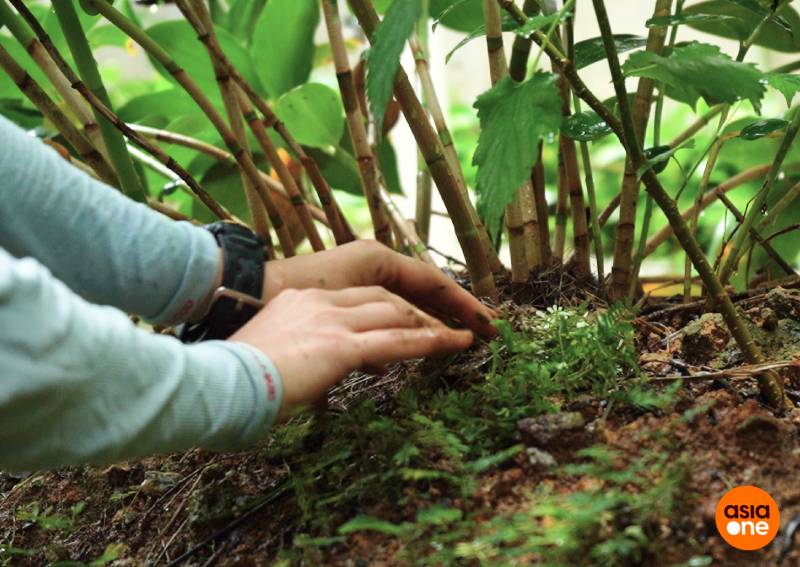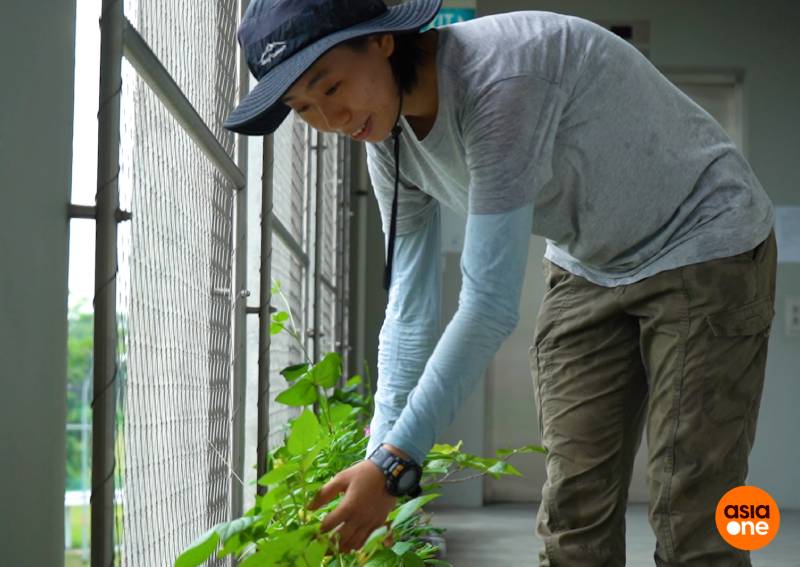Why I Do What I Do is an original AsiaOne series where we showcase people with uncommon professions and what it takes to get there.
Like any other mother, there's nothing that she wouldn't do for her 'children'.
However, for Ang Ee Peng, her children are the plants that line the grounds of Wah Son engineering building at Seletar Aerospace Park.
And for them, this plant parent would do nearly anything — digging her hand through waste, pulling our weeds and worms with her bare hands, asking for quail manure and rice water, and running across the road whenever she spots National Parks Board contractors cutting down branches.
It's all in the day's work for this urban farmer who is up even before dawn breaks. "I start my day by watering my babies. They need to be watered before the sun comes out. After that, I would go into other works like weeding, pruning and harvesting for the kitchen. I will also be making compost or starting new garden beds. There's no real fixed schedule," she shared.
It started with a trip to Japan
At first look, given the 33-year-old's petite frame, you would never guess that she's one to do labour intensive work. And she wasn't. That is, until her three-year stint in Japan in 2012.
The former product photographer was searching for a deeper meaning to life and decided to pack her bag for a Japanese Zen monastery.
She recalls arriving at Antaiji, located in Japan's Hyogo prefecture, after hiking through the snow for four hours.
"When the people in the monastery first saw me, they wondered what I could do as I was very fair and thin. I looked like I couldn't even lift a handful of firewood," she shared with a chuckle.
"The monk suggested to the abbot, why not allow me to translate their website to Chinese? But the abbot said there were to be no exceptions, and I had to do samu (physical work) like everyone else."
While this meant moving rocks, collecting firewood, doing roof repairs and cleaning drains, a huge part of the work was farming as the monastery residents subsisted on what they could produce.

"We had to farm for our own vegetables and rice to sustain our own lives. It was a tough way for me to learn farming for three years, but eventually, I did," she said, adding, "I became a lot stronger, and could lift things that nobody would have believed that I could lift when they saw my size."
She describes herself as not having any farming experience prior to Japan. "I was even afraid of insects like earthworms, mosquitos and bees because I didn't understand them."
Now she expertly deals with insects in her daily work, where even dealing with a wasp's nest doesn't faze her — she just calmly uses a bamboo stick to take it down and runs away before any wasp can get to her.
Building a career in nature with regenerative farming
While she had gone to Japan to learn more about Buddhism, Ee Peng instead came away with a love for nature. "My wish was to be close to nature and do my part in reducing waste, and this naturally steered me towards urban farming," she explained. "This also lets me work with my body instead of just sitting at a desk or behind a camera."
While she has done farming for other companies in Singapore, it is here in the Wah Son Engineering building that she has been able to put to full practice her personal beliefs of regenerative farming, thanks to an affinity with the owner of the building.
"We realised that our philosophy of having a more sustainable way of living was similar and she invited me to man the space here," she shared.
When she first started, some work had already been done, but there was a lot more to do. And rather than speeding up the process artificially, Ee Peng prefers to take a regenerative approach, where rehabilitation of the ecosystem using natural means is preferred over pumping the soil with chemicals.

Simply put, she utilises natural resources to make the soil fertile and suitable for planting produce. Instead of purchasing fertilisers, she makes compost with the waste materials from the nearby kitchen, and she will wait for the soil to naturally heal and be ready than to rush the process, even though the waiting time may be rather long.
"With regenerative farming, we aim to put in as little materials from nurseries as possible. We also aim to nurture plants instead of replacing them when they don't look good or when they are sick."
[[nid:484896]]
Hence when she first started, she didn't get to work immediately by planting lots of edible plants. Instead, she chose to grow plants that she knew would improve the soil.
"Lemongrass helps to loosen the soil and you can cut it for mulch (material that is spread or laid over the surface of the soil as a covering). It's an added bonus that you can use it in herbal tea too," she explained.
"With regenerative farming, we hope that in five to 10 years, the soil will be able to naturally support us by growing plants well without too much additional human input in time to come, making it truly sustainable."
And Ee Peng is a big believer of using what's available. "A lot of materials are available around, so you don't need to make an extra effort to purchase them. Not even specific seeds." Her mini pumpkin patch is proof of that — with the seeds from just one pumpkin that she had purchased from the supermarket, she has yielded a 4kg harvest, and counting.
It takes a village to raise a garden
She may be the main person in charge of running the garden, but getting the community in Wah Son building to be involved and invested was also important.
The employees from the various companies in the building, including some catering company tenants, started showing interest in what she was doing as the plants began growing more vibrantly. "That's how I started to interact with them and discovered how I could repurpose some of the waste in the kitchen such as the water used to wash the rice."

It wasn't an easy process though as the chefs there were used to discarding the water out of habit and it was after much persistence on Ee Peng's part with constant, well-meaning reminders. "Now every time he sees me, he will remember 'oh ya, rice water'."
The staff also take time to sort out their waste according to how she had requested for them to do so, allowing her to more easily create the compost she needs for the garden.
"These are the things that show me that people have adapted to the common vision that we all have the garden, instead of me having to put in a lot of effort by myself. Everyone has come into this and helped make the garden better."
When business slowed down for the catering company, the kitchen staff turned into volunteer gardeners. And even this turned out to be a learning process for both Ee Peng and the staff.
"Some things that I thought would be common sense to most people are actually not really common knowledge," she said with a laugh, sharing that even differentiating what was a weed and what was a plant had to be taught, as did how much water to give to each plant.
"It's not just about nurturing plants with my job, I learn to nurture people too."
Finding her meaning through nature and her plant babies
Other than caring for the garden, Ee Peng also runs corporate workshops and conducts farm tours to supplement her income.
"Being an urban farmer, I can't shop for clothes once a week, or eat Haidilao twice a week. But it's enough to sustain a basic lifestyle. I also farm a lot of vegetables which I can bring home to cook occasionally. So I'm mainly paying for my transport and giving an allowance to my family."

Her parents were, as to be expected, rather worried for her initially when she first said that she was going into farming. But her family has been supportive, even setting waste-sorting corners in the house after she shared with them about waste reduction.
She does still have naysayers though, who think that she's not making a serious living through farming, but she brushes these criticisms aside as her job provides more than just material satisfaction — just thinking about her 'children' is all the happiness that she needs.
"Thinking about my plants helps to motivate me, and maybe some people can relate to it. Seeing a seed sprout after a week, or just seeing things grow in the garden, like an eggplant. Little things like that actually make me very happy. I'm glad that nature is sustaining my life, more than I am supporting it."
Why I Do What I Do is an original AsiaOne series where we showcase people with uncommon professions and what it takes to get there.
kailun@asiaone.com

